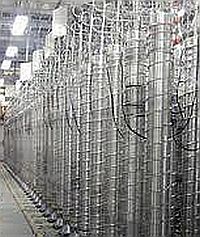Snowden: NSA, Israel Co-wrote Stuxnet

The US’ National Security Agency worked with Israel on the Stuxnet attack on Iranian uranium processing centrifuges, according to ex-intelligence contractor Edward Snowden
The US’ National Security Agency (NSA) collaborated with the Israeli government to create the program used in a cyber-attack that disrupted Iran’s uranium processing capability and delayed its nuclear ambitions, former intelligence consultant and whistleblower Edward Snowden said in an interview published in the German magazine Der Spiegel.
Allegedly conducted prior to Snowden’s release of classified intelligence documents, the interview describes the broad surveillance conducted by the NSA and other nations’ intelligence agencies.
Intelligence cooperation
In addition to other assertions, Snowden confirmed that the NSA shares surveillance and cooperates with other nations, including Israel.
“Yes, [they cooperate] all the time. The NSA has a massive body responsible for this: FAD, the Foreign Affairs Directorate,” Snowden said in the interview. When asked if the NSA helped create Stuxnet, he added: “[The] NSA and Israel co-wrote it.”
 The interview was originally conducted by independent security researcher Jacob Appelbaum as a way to verify the credibility of a then-unknown NSA analyst. The edited text of the translated interview was published by Cryptome.org, a site that archives documents related to computer security and digital rights.
The interview was originally conducted by independent security researcher Jacob Appelbaum as a way to verify the credibility of a then-unknown NSA analyst. The edited text of the translated interview was published by Cryptome.org, a site that archives documents related to computer security and digital rights.
The assertion that Stuxnet is the work of the United States and Israel is not a new one. Many in the security community had suspected as much, when an anonymous Obama administration official confirmed that the countries had worked together to create the attack, New York Times Chief Washington Correspondent David Sanger wrote in his book Confront and Conceal: Obama’s Secret War and Surprising Use of American Power, published in June 2012.
The interview, which has been shortened and edited from the original technical interview, covers a number of other of topics as well. In the interview, Snowden discussed cooperation between national intelligence agencies, which he claims frequently share information without oversight.
TEMPORA
In addition, the United Kingdom has its own surveillance programme, dubbed TEMPORA, which can capture and buffer network communications for up to three days, he said.
“TEMPORA is the signals intelligence community’s first ‘full-take’ Internet buffer that doesn’t care about content type and pays only marginal attention to the Human Rights Act,” he stated in the interview. “It snarfs everything in a rolling buffer to allow retroactive investigation without missing a single bit.”
In addition, while the NSA has repeatedly assured US citizens that it does not collect any content from communications without a court order, Snowden maintains in the interview that the agency finds the metadata – who communicated with whom and when – far more valuable.
“In most cases, content isn’t as valuable as metadata because you can either re-fetch content based on the metadata or, if not, simply task all future communications of interest for permanent collection since the metadata tells you what out of their data stream you actually want,” Snowden said.
Do you know all about IT and the law? Take our quiz.
Originally published on eWeek.